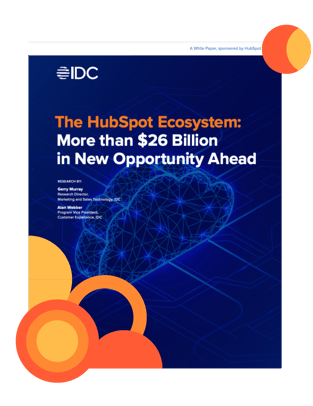Disclaimer: This post was originally published in March 2021. In August 2022, IDC conducted a refresh of its 2021 report that resulted in updated projections for the HubSpot ecosystem’s performance. The figures in this post have been updated to reflect the most recent predictions.
HubSpot, the customer relationship management (CRM) platform for scaling companies, announced today the publication of an updated IDC White Paper, sponsored by HubSpot, The HubSpot Ecosystem: More Than $26 Billion in New Opportunity Ahead, that shows that HubSpot’s partners are uniquely positioned to provide the software and services needed for scaling companies to adapt to doing business in an increasingly digital-first world. The white paper quantifies the revenue generated by the thousands of app and solutions partners that provide the products and services that accompany HubSpot’s CRM platform software. The global HubSpot partner ecosystem is projected by IDC to grow from $7.4 billion in revenue in 2021 to $17.9 billion in 2025, representing an additional $26.2 billion in revenue above and beyond the 2020 level over the next four years.*
According to IDC, the majority of consumers will continue to expect a digital-first experience even after the pandemic has ended. Companies met with this challenge often resort to cobbling together “best of breed” solutions to build a custom tech stack. IDC predicts that cloud computing will account for 22% of IT spending worldwide in 2025, which means there is an ever-growing sea of software options these companies need to wade through to find the ones that will work best for them. Unfortunately, this “cobbled” approach is often ineffective and adds painful friction for both the company and its customers due to a lack of visibility across those disparate systems. With the average HubSpot customer expecting to add more than five types of additional marketing software, such as account-based marketing and video production, in the next year, that can add up to a lot of wasted time and headaches. According to the IDC White Paper, HubSpot is uniquely positioned to solve those challenges with its powerful and easy-to-use CRM platform and accompanying ecosystem of thousands of app and solutions partners.
“We crafted our CRM platform with extensibility in mind, which means that our customers can easily integrate their HubSpot instance with other services and solutions that are tailored to their specific needs, as they need them,” said Yamini Rangan, CEO at HubSpot. “As our ecosystem grows, so too will the number of options that are available to customers to help them gain the greatest possible value from our platform. We’re excited about the opportunity this presents for both our trusted partners and our customers.”
According to the IDC White Paper, the needs of HubSpot customers will continue to grow and evolve as they scale and adapt to a digital-first mindset. This represents three key areas of opportunity for HubSpot app and solutions partners over the next four years:
- More advanced full-suite implementations and migrations
- More integrations across the entire customer journey
- More complex and broad services including strategy, migration, and operating services
“The strength of our ecosystem can be mapped back to the power and usability of our CRM platform,” said Scott Brinker, VP of platform ecosystem at HubSpot. “Having a strong software foundation has allowed us to foster a vibrant community of solutions partners who do far more than implementation, and a network of developers who see the potential to build seamlessly integrated applications. This is a great time for our existing partners to think about new ways that they can support digital transformation, and for new partners to join our ecosystem to offer even more solutions and support to help our customers grow better.”
Download a full copy of the IDC White Paper, Sponsored by HubSpot, “The HubSpot Ecosystem: More Than $26 Billion In New Opportunity Ahead, doc #US48984622, (August 2022)” here.
IDC Methodology
For nearly two decades, IDC has been sizing the ecosystems for software vendors utilizing IDC market studies, forecasts, and surveys that illuminate the links between software and the services and products that must accompany software for implementations to be complete. At times but not in this case, we have looked at internal costs as well.
*This is the difference from each year’s revenue above 2021 revenue and then summed.
